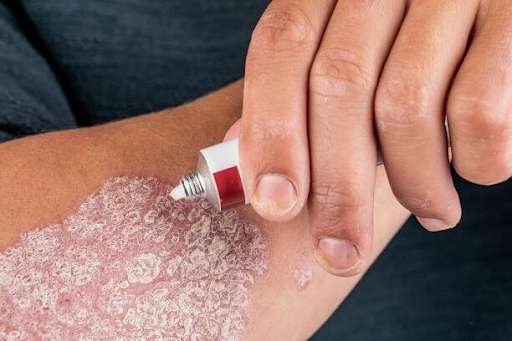No. Psoriasis cannot be cured currently. Despite the lack of a known cure for Psoriasis, skin lesions may completely or almost completely disappear. The success of available treatments suggests that a cure may be found for various types of psoriasis, including mild plantar psoriasis.

More than 7.5 million persons in the US are affected by the chronic inflammatory disease psoriasis. It is classified by experts as an immunological-mediated disease, indicating that inflammation results from immune system failure. They don’t comprehend the root of it, though.
Treatments aim to lessen systemic inflammation and physical symptoms, such as skin lesions. People with Psoriasis can control their symptoms and achieve remission with effective treatment.
This article examines the state of psoriasis treatment and speculates what the future may hold.
What treatments are available right now for psoriasis?
Psoriasis still has no known cure, according to experts. However, the symptoms of Psoriasis can frequently be markedly reduced by available treatments. Psoriasis is treated by doctors using a variety of methods. Doctors have a wide range of alternatives thanks to the diversity of readily available treatments, enabling them to customize treatment programs and switch medications as needed. This adaptability is crucial because not every patient will react to treatment similarly.
The following are some possible treatments for psoriasis that doctors might provide:
Topical: Products that are applied directly to the skin by a patient include creams, ointments, lotions, and other items. They can lessen discomfort and aid in lessening plaque appearance. Doctors frequently use them to treat mild cases of Psoriasis.
Phototherapy: This treatment method uses light exposure under medical supervision to treat Psoriasis plaques.
Drugs administered systemically: These treatment methods address systemic inflammation. Small molecule drugs and biologics are among them. Doctors typically prescribe them for mild to severe psoriasis symptoms.
Complementary therapies are a broad treatment category that includes acupuncture and dietary supplements, including turmeric for psoriasis. Although these treatments can help with psoriasis symptoms, doctors do not currently view them as a part of Western traditional medicine.
One or more drugs and therapies may be part of a person’s treatment strategy to deal with their signs and inflammation. If a patient is not happy with the outcomes of their present treatment, they should consult their prescribing physician. It’s possible that different forms of treatment yield superior outcomes.
When do doctors deem psoriasis treatment to be effective?
The National Psoriasis Foundation presented the first psoriasis treatment targets for the United States in 2016. These targets are meant to assist more psoriasis sufferers in achieving clear skin. The treatment targets include:
- Within three months of beginning a new treatment, psoriasis affects less than one percent of a person’s body surface area.
- A clinician may adopt a “wait and see” strategy if treatment results in modest improvement but does not reduce Psoriasis to less than 1% BSA within three months.
- A BSA of 3% or less or a 75% decrease in BSA within three months of beginning a new treatment constitutes a satisfactory response to treatment.
- If a patient’s symptoms do not improve within three months, they and their doctor may opt to continue the same action or attempt an alternative strategy.
- The dosage of the current medicine may now need to be changed, or a new therapy may need to be started entirely.
- A doctor should continue to follow up with the patient after a successful treatment every six months
Are there psoriasis treatments expected in the future?
To better the quality of life of those with Psoriasis, researchers are always working to increase the number and caliber of therapies available. The National Psoriasis Foundation reports that scientists are looking into several fresh treatment options for Psoriasis. Investigations are now being conducted on a taping of a novel topical medicine. Although this new topical doesn’t contain any steroids, it might be just as useful as those that do. It doesn’t include steroids; thus, it can be applied to any body part.
Is it possible to cure Psoriasis?

Nobody can say for sure if there will ever be a psoriasis cure. However, scientists seem optimistic. A person in remission can go years without experiencing a symptom return, thanks to the medicines that are currently accessible. But most remissions persist between one and twelve months. Psoriasis may return after remission worse than before.
However, in the future, Psoriasis might be efficiently managed or perhaps cured because of advancements in medical care.





